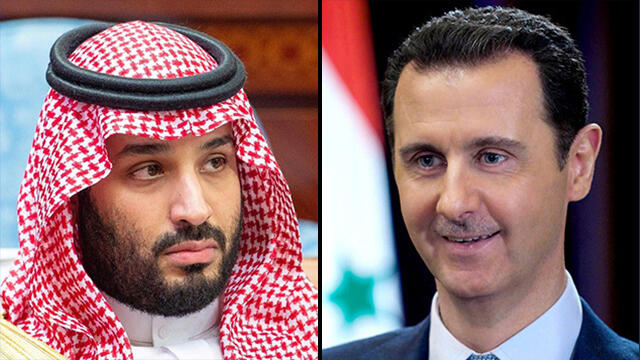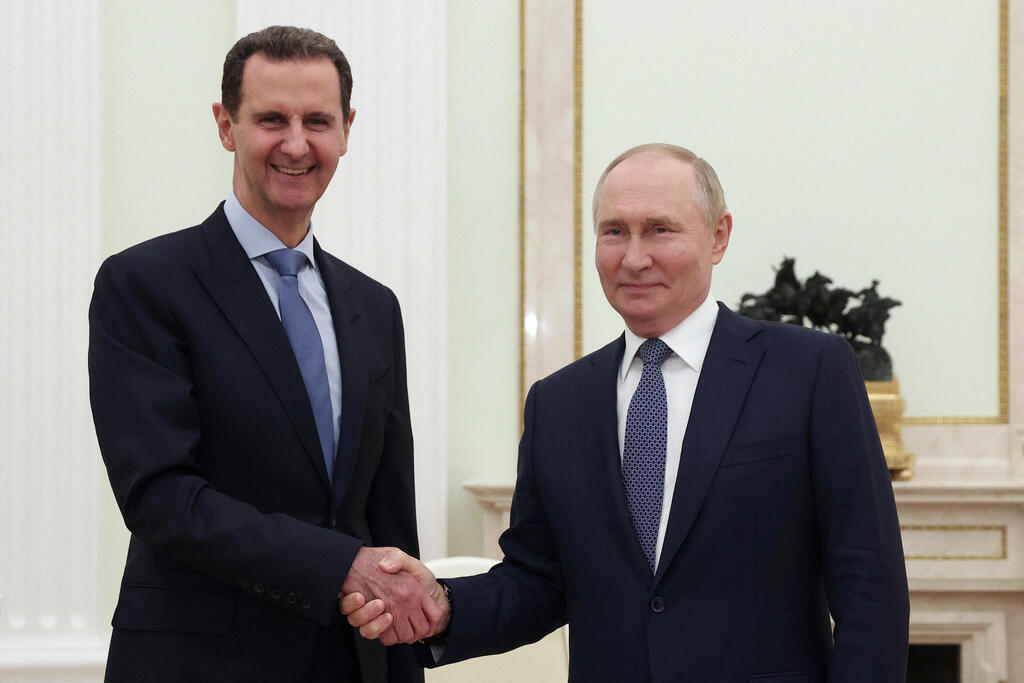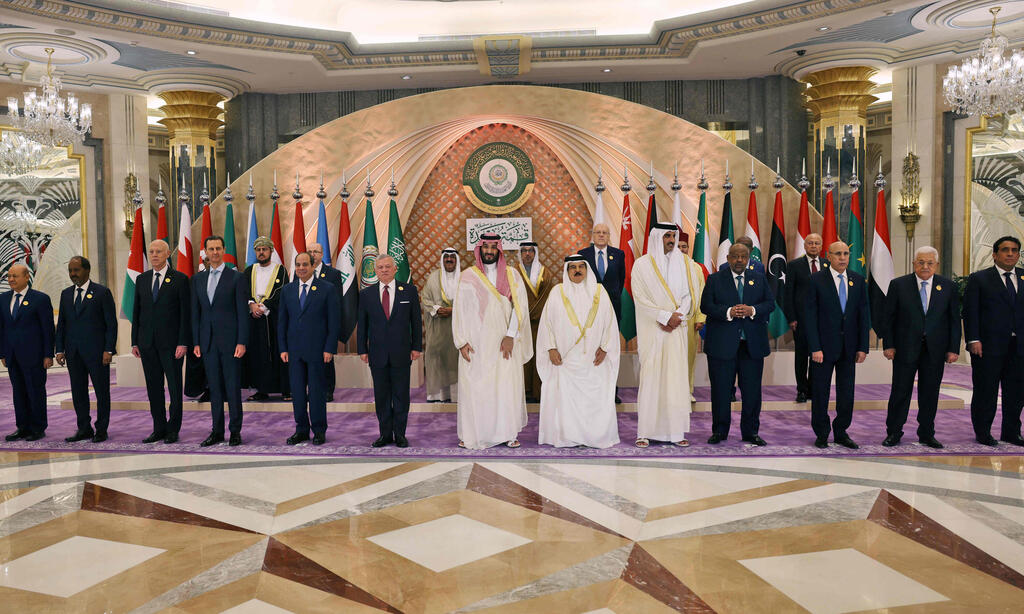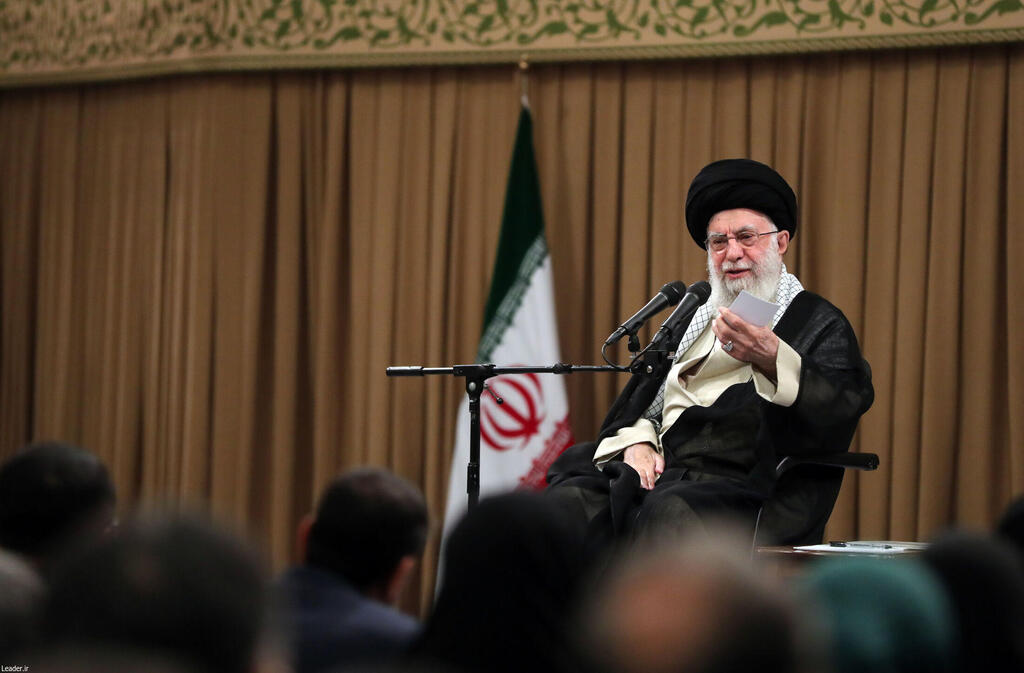Getting your Trinity Audio player ready...
The process of normalizing relations between the Gulf Cooperation Council countries and Syria has begun to take accelerated practical steps after more than 12 years of estrangement following the civil war that took place in Syria in the wake of the Arab Spring.
Saudi Arabia, the largest Gulf country, officially launched relations this year after exchanging ambassadors with Damascus, while flights between Damascus, Riyadh, Manama, Abu Dhabi and Kuwait began gradually returning to transport citizens.
5 View gallery


Saudi Crown Prince Mohammed bin Salman and Syrian President Bashar al-Assad
(Photo: Reuters)
Several Gulf countries also began returning Syrian refugees to their countries by stopping granting special privileges to Syrians, as the Gulf countries do not consider Syrians as refugees. Still, after the start of the conflict in Syria, they granted them special privileges to facilitate their obtaining residency and work.
At the same time, several Arab countries also began the same step, including Egypt, Iraq and Lebanon, which officially started deporting refugees and asked them to leave. In contrast, the status of Syrian refugees in Jordan remains unknown.
There are no official statistics on the number of Syrian refugees in the GCC countries, except for Saudi Arabia, which announced that one million Syrians reside on its soil and does not consider them as refugees, but instead, they have special treatment. However, unofficial estimates indicate that the number of Syrians in the Gulf reaches 1.5 million.
It is also expected that more conferences will be held during the coming period for the reconstruction of Syria, which will provide grants amounting to billions of dollars after the war destroyed more than half of Syria’s area. There are more than half of the Syrians displaced within their country.
The return of relations came after an Arab agreement to return Syria to the Arab League in exchange for simultaneous steps taken by Syrian President Bashar al-Assad, including issuing a general amnesty for all Syrians, holding elections and constitutional change that paves the way for stable political life in Damascus.
5 View gallery


Bin Salman and Assad meeting at the Arab League Summit in Jeddah, Saudi Arabia
(Photo: Reuters)
Qatar still maintains the most conservative position toward the Syrian regime. In light of the current Arab trend to reintegrate Syria into its surroundings, Qatar announced that it would not normalize its relations with the Damascus government, but it also confirmed that it would not be an “obstacle” to the step taken by the Arab League.
Although the Gulf countries—except Qatar—have restored their relations with Syria, these relations are not expected to last long, given the Iranian-Syrian rapprochement, the great Iranian interference in Damascus, and its control over its decisions.
The history of Gulf-Syrian relations is full of political disagreements and estrangement, as Iranian-Syrian relations have always been a point of contention between these regimes.
The disputes date back to the Islamic Revolution in Iran when Syria disagreed with the Arab position that supported Iraq in the “Iran-Iraq war” that lasted from 1980 until 1988. The dispute also continued after Syria signed several major and unprecedented security agreements with Iran in 2006, constituting a major concern among the GCC.
The Syrian intervention in Lebanon was also one of the most important reasons for the Gulf-Syrian dispute. The Gulf states stood by Lebanon after the assassination of former Prime Minister Rafik Hariri in February 2005, and the Assad regime was indirectly accused of supporting Hezbollah in the assassination.
At the beginning of 2011, several Gulf countries supported several Syrian opposition factions, including armed factions, and were quick to sever diplomatic relations with Damascus against the backdrop of the “violence” carried out by the Assad regime toward citizens in its attempt to suppress the rebellion and demonstrations that took place against it. However, This support stopped after several years due to ISIS entering the confrontation line with the Assad regime.
Several Gulf countries previously accused the Syrian regime of providing a suitable environment for training the “fifth column,” which are Gulf citizens who pledge allegiance to Iran and work as sleeper cells. They were trained by the Iranian Revolutionary Guard and Quds Force in camps in Iran, Iraq, Syria and Lebanon.
Awad Al-Shammari, a Saudi political researcher in Arab affairs, told The Media Line, “The fate of Syrian-Gulf relations cannot be predicted, as they have been cold so far, and what happened is merely the reactivation of some diplomatic agreements, the return of refugees to their homeland, and the opening of the door to trade relations.”
He added, "History is full of political disputes with Syria, but now there is a Gulf-Iranian rapprochement, and perhaps this will positively affect the return of these relations."
He also says, "Syria now also needs all the support to reconstruct the country and make life vibrant again, and this requires balanced relations with all countries, and perhaps this is one of the reasons for the success of this relationship."
Rashid Al-Hajri, a Qatari journalist, told The Media Line, “We cannot forget everything that happened in Syria, including the Syrian regime’s killing of the people and the displacement of more than 15 million Syrians, at least 5 million of whom are abroad, and suddenly we say that relations must be restored.”
He continued, "Qatar has a clear and firm position. The Syrian people must agree on who will rule them, and there must be at least a transitional political process, and these faces that caused devastation in Syria must disappear before relations can be restored."
He also said, "Iran will not be an obstacle to the return of relations with Syria, but this regime, which used all brutal methods of violence against its people, cannot be accepted again into the Arab embrace."
Mohammad Huwaidi, a Syrian researcher and political writer, told The Media Line, “The Arab countries, including the Gulf states, realized that they made a mistake when they stood against the legitimate regime in Syria and that it is not possible to support terrorism or armed groups at the expense of the legitimate regime.”
He continued, "Now Syria is open to the Arabs, and Arab countries are open to Syria. We must turn the page on the past and begin new, balanced relations based on respect for the sovereignty of states. No one should interfere in the affairs of the latter in any way."
5 View gallery


Assad and Russian President Vladimir Putin
(Photo: Sputnik/Valeriy Sharifulin/Pool via REUTERS)
Huwaidi also said, "Syria's relations with any country are a sovereign matter, and no one should interfere with it. Iran has contributed to preserving Syria's stability, fought against armed terrorist groups, and supported the Syrian army. It is an allied country, and Syria cannot do without it."
He also said, "The Gulf countries are now restoring their relations with Iran because they have realized that it is not possible to sever the relationship with a neighboring country, with which we have many things in common. On the contrary, some are allied with distant countries, and we do not have any relations with them, and these countries do not stand by their side." Iran also stood by Syria in its ordeal over the past years.”
Hossam Saboun, a Syrian dissident residing in Turkey, told The Media Line, “Syrian-Gulf relations will not continue. The Assad regime is directly controlled by Tehran, and Iran will certainly use Syria to destroy Arab regimes.”
He said, "Syria is now a station for smuggling drugs and weapons to the Gulf states and Jordan, and its relationship with Jordan is not good. The Jordanian regime has strong relations with the ruling families in the Gulf, which in turn will not allow anything that destabilizes the security and stability of the Hashemite Kingdom of Jordan."
He added, "Maybe now we are talking about restoring diplomatic relations, but there are millions of Syrians who will not return to Syria, even if the war calms down. Their areas are destroyed or not under the control of the regime, and they do not trust the Assad regime to arrest them again despite the issuance of the amnesty. He has a long history of breaking covenants and deceiving the people."
He continued, "Gulf-Syrian relations will not last more than two to three years at best, before disagreements begin over the training of Gulf members by the Revolutionary Guards and the Iranian Quds Force, in order to strike Gulf interests within the Gulf Cooperation Council countries."



